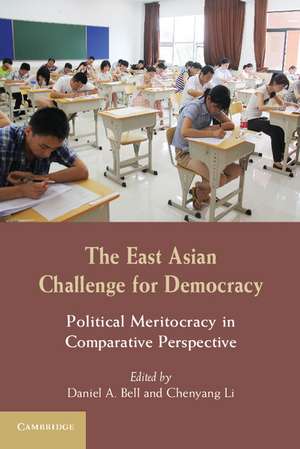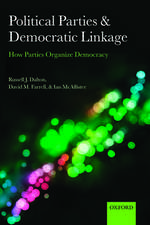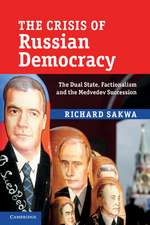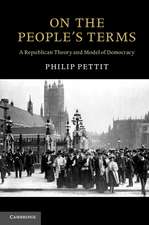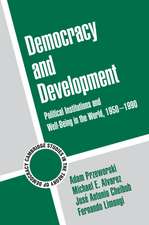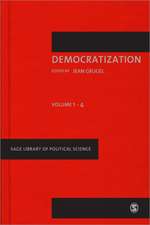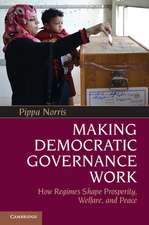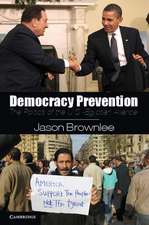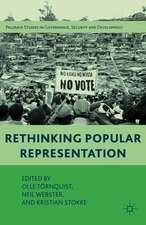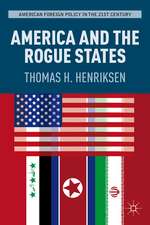The East Asian Challenge for Democracy: Political Meritocracy in Comparative Perspective
Editat de Daniel A. Bell, Chenyang Lien Limba Engleză Paperback – 11 aug 2013
| Toate formatele și edițiile | Preț | Express |
|---|---|---|
| Paperback (1) | 324.03 lei 6-8 săpt. | |
| Cambridge University Press – 11 aug 2013 | 324.03 lei 6-8 săpt. | |
| Hardback (1) | 700.20 lei 6-8 săpt. | |
| Cambridge University Press – 11 aug 2013 | 700.20 lei 6-8 săpt. |
Preț: 324.03 lei
Nou
Puncte Express: 486
Preț estimativ în valută:
62.02€ • 67.39$ • 52.13£
62.02€ • 67.39$ • 52.13£
Carte tipărită la comandă
Livrare economică 21 aprilie-05 mai
Preluare comenzi: 021 569.72.76
Specificații
ISBN-13: 9781107623774
ISBN-10: 1107623774
Pagini: 412
Ilustrații: 1 b/w illus. 8 tables
Dimensiuni: 152 x 229 x 23 mm
Greutate: 0.57 kg
Ediția:New.
Editura: Cambridge University Press
Colecția Cambridge University Press
Locul publicării:New York, United States
ISBN-10: 1107623774
Pagini: 412
Ilustrații: 1 b/w illus. 8 tables
Dimensiuni: 152 x 229 x 23 mm
Greutate: 0.57 kg
Ediția:New.
Editura: Cambridge University Press
Colecția Cambridge University Press
Locul publicării:New York, United States
Cuprins
Part I. The Theory of Political Meritocracy: 1. Political meritocracy and meritorious rule: a Confucian perspective Joseph Chan; 2. A Confucian version of hybrid regime: how does it work and why is it superior? Tongdong Bai; 3. Confucian meritocracy for contemporary China Ruiping Fan; 4. The liberal critique of democracy John Skorupski; 5. Meritocratic representation Philip Pettit; Part II. The History of Political Meritocracy: 6. Between merit and pedigree: evolution of the concept of 'elevating the worthy' in pre-imperial China Yuri Pines; 7. A society in motion: unexpected consequences of political meritocracy in late imperial China, 1400–1900 Benjamin Elman; 8. Meritocratic democracy: learning from the American Constitution Stephen Macedo; Part III. Realizing Political Meritocracy Today: 9. How East Asians view meritocracy: a Confucian perspective Doh Chull Shin; 10. Political meritocracy in Singapore: lessons from the PAP government Benjamin Wong; 11. Meritocracy and political liberalization in Singapore Kenneth Paul Tan; 12. China's meritocratic examinations and the ideal of virtuous talents Hong Xiao and Chenyang Li; 13. Reflections on political meritocracy: its manipulation and transformation Philippe C. Schmitter; 14. Political meritocracy and direct democracy: a hybrid experiment in California Nicolas Berggruen and Nathan Gardels.
Recenzii
'In theory, democracy works beautifully. In practice, it does not. Indeed, the American democratic system has effectively been hijacked by special interests through a process best described as institutionalized legal corruption. Clearly the world needs new political thinking, bringing together the best of the East and the West. This is what this volume does, reminding us that political wisdom springs from all corners of the world. It could not be more timely. A must-read.' Kishore Mahbubani, Dean, Lee Kuan Yew School of Public Policy, National University of Singapore, and author of The Great Convergence: Asia, the West, and the Logic of One World
'Drawing on Eastern and Western theories, histories, and contemporary experiences, The East Asian Challenge for Democracy is a searching, provocative, and above all open-minded exploration of meritocracy. By highlighting both strengths and weaknesses of meritocracy, this wide-ranging but well-integrated volume challenges everyone - from doctrinaire democrats to rigid meritocrats - to enter into a renewed conversation about political possibilities.' Stephen Angle, Wesleyan University
'In this volume, Bell and Li have made tremendous efforts in bringing together more than a dozen … known experts, exploring rich traditions and contemporary practices of meritocracy in East Asia, particularly China and Singapore. All who are interested in the future of China and other parts of East Asia should read this excellent book.' Zheng Yongnian, National University of Singapore
'The present volume invokes the Chinese tradition of 'meritocracy', focused on virtuous public leadership, assessing its value and contemporary feasibility from a great many angles. The scope and intellectual rigor of these assessments is unparalleled in the literature. The central problem faced by all contributors is implicit in the term 'meritocracy' itself: how can 'merit' or virtue be combined with political power ('-cracy'), given Lord Action's famous saying that all power inevitably corrupts?' Fred Dallmayr, author of In Search of The Good Life and The Promise of Democracy
'Bell and Li posit a provocative thesis that East Asian political meritocracy poses a deeper challenge to liberal democracy than most in the West suspect. … Bell and Li, together and separately, have done much to reinvigorate both the scholarly discussion and public dialogue regarding the virtues of political meritocracy. Their book is an excellent compendium for both scholars and students interested in the impact that modern political Confucianism and political meritocracy play in China, Singapore, East and South Asian societies, as well as the implications of political meritocracy's potential influence on liberal democracy and democratic theory.' Jon R. Taylor, Journal of Chinese Political Science
'Drawing on Eastern and Western theories, histories, and contemporary experiences, The East Asian Challenge for Democracy is a searching, provocative, and above all open-minded exploration of meritocracy. By highlighting both strengths and weaknesses of meritocracy, this wide-ranging but well-integrated volume challenges everyone - from doctrinaire democrats to rigid meritocrats - to enter into a renewed conversation about political possibilities.' Stephen Angle, Wesleyan University
'In this volume, Bell and Li have made tremendous efforts in bringing together more than a dozen … known experts, exploring rich traditions and contemporary practices of meritocracy in East Asia, particularly China and Singapore. All who are interested in the future of China and other parts of East Asia should read this excellent book.' Zheng Yongnian, National University of Singapore
'The present volume invokes the Chinese tradition of 'meritocracy', focused on virtuous public leadership, assessing its value and contemporary feasibility from a great many angles. The scope and intellectual rigor of these assessments is unparalleled in the literature. The central problem faced by all contributors is implicit in the term 'meritocracy' itself: how can 'merit' or virtue be combined with political power ('-cracy'), given Lord Action's famous saying that all power inevitably corrupts?' Fred Dallmayr, author of In Search of The Good Life and The Promise of Democracy
'Bell and Li posit a provocative thesis that East Asian political meritocracy poses a deeper challenge to liberal democracy than most in the West suspect. … Bell and Li, together and separately, have done much to reinvigorate both the scholarly discussion and public dialogue regarding the virtues of political meritocracy. Their book is an excellent compendium for both scholars and students interested in the impact that modern political Confucianism and political meritocracy play in China, Singapore, East and South Asian societies, as well as the implications of political meritocracy's potential influence on liberal democracy and democratic theory.' Jon R. Taylor, Journal of Chinese Political Science
Descriere
This volume examines the rise (or revival) of political meritocracy and what it will mean for political developments in China and the rest of the world.
